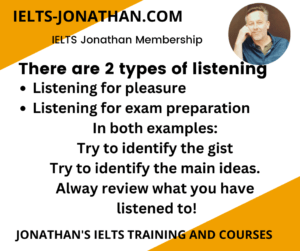IELTS Listening: Tips and Resources for IELTS Listening Practice
Two types of listening for IELTS
In your IELTS preparation you should be clear that there are two types of listening.
There is listening for pleasure and there is listening for a purpose.
Both are useful but like reading in English, many IELTS students struggle to become effective listeners and this makes their IELTS preparation more difficult.
Listening to your favourite podcast, news item or watching movies all contribute towards your overall listening ability in English and, by all means, listen for pleasure.
But remember that the IELTS is testing something specific: your skill and ability to listen for a purpose.
So if you are listening to something that you enjoy, ask yourself some questions:
Try to establish the overall the gist of the article
Try to identify the key ideas
Do this in the run up to your IELTS test, and try this with any kind of listening that you do.
Create a good habit
Clearly, the best way to improve your listening for IELTS is to actually increase the amount of listening you do.
We usually only listen to things that we want to listen to, so this will take some discipline and it will take some dedication.
Try to create a habit of listening to at least something: the news, a play, a story, or a science programme.
Don’t choose anything too long as you will get bored and you will waste your time.
Better is to listen for a short time and often, rather than listening for a long time and only occasionally.
It is also a good idea to listen to a number of different presenters rather than tune in to the same voice all the time.
This will better prepare you for the range of dialects that appear in the IELTS listening test.
Listening for a purpose
Ask why you are listening to an article and use the title of the programme or news article to help you understand the general topic.
Try to get an idea of the gist.
Most articles provide a summary of what the article is going to be about near the beginning.
Listen for keywords: these may help you identify the main ideas
Always try and review what you have done at the end even if you didn’t enjoy the article.
This does not need to be for very long; you just need to review and be clear about what you understood.
Resources for general IELTS Listening
As you now know, there are two types of listening but many IELTS candidates make the mistake of just focusing only on the IELTS listening test.
Don’t just limit yourself to IELTS practice tests!
I recommend you listen to a wide variety of materials in your IELTS preparation.
This will help your listening in English skills in general.
Here is a reliable list of listening free website and materials you can use:
- TED.COM
- TED.COM Short Talks
- Listen and Watch from the British Council
- BBC Radio World Service
- BBC Radio Radio 4
There are many more…..
When you tune into any of these websites, don’t just listen but follow the same process as any listening practice I have described already.
Try and understand the gist of the conversation.
Try identifying the key points the speaker or speakers are making.
If you want to make notes, you can, but focus on identifying the gist and key points before moving to another monologue or dialogue.
The aim should be to increase your Range and Listening Fluency so you can deal with a wider number of situations, dialects and accents.
How to prepare for IELTS listening
Once you are a confident listener you can become more specific.
Collect a number of IELTS tests to go through.
Practise looking at the exam questions and how they are presented.
Practise the exam and complete the answers.
Check the answers that you get wrong
See if you can understand the choices you made, why you made them and why they are wrong.
Resources for the IELTS listening test practice
Once you are actively preparing for the IELTS Listening exam, it is obviously very important to take as many practice exams as you can and also to try and create an IELTS test environment.
If you are new to the test:
Do a section at a time and review it each section one by one.
If you are more experienced, then do a complete test, without a break and under timed conditions and don’t forget to review your answers.
As a rule, practising the IELTS Listening Test means you should be listening for the overall gist, or if you have a practice paper available, specifically for the answers as written.
Follow these tips
Don’t stop the recording or listen again.
In the IELTS test you only listen to the recording once and then you have to answer.
So get into the habit of doing this.
You can, of course, review and recycle a test after a few weeks.
I think that this is generally a good preparation tip to follow because it will help you understand how some of the test questions work, which will help with the next practice test.
Answering questions the first time around also gives you a realistic sense of how well you are performing.
Then, as you review your answers, go back to the listening passages and study them closely.
Most textbooks and practice exams provide a transcript of the listening materials for closer study so use these to your advantage.
Try to understand each mistake you make and keep a record of your score
So you can measure your progress over time
So you can compare to earlier attempts
and note new vocabulary which is not scientific or specialised.
These is my basic advice for IELTS listening in general.
To find out how to answer IELTS questions specifically, search this website for answers. 🙂
IELTS LISTENING MARKING CRITERIA
I’m Jonathan
I’ve taught IELTS and University English in more than a dozen universities and schools around the world.
I’m a parent, traveller and passionate about language teaching and helping students achieve their dreams.
Whilst living in Austria or working in Asia, I run IELTS courses to help students get to where they want to be.
If you are serious about IELTS, connect with me to see how I can help you.






Was this helpful? Leave a comment :)